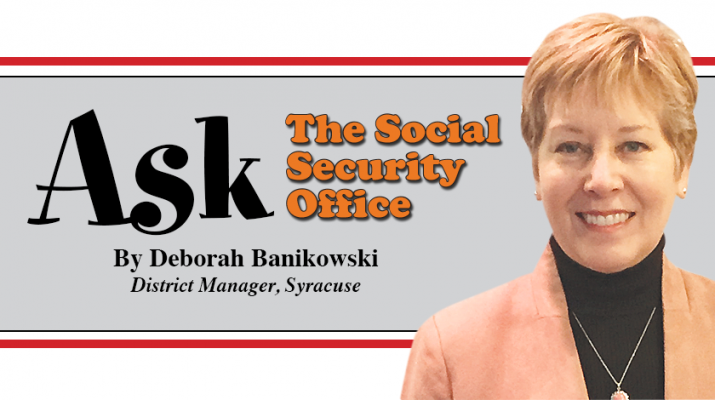By Deborah Banikowski
District Manager, Syracuse
 Scammers go to great lengths to trick you out of your personal information. We want to help you protect your information by helping you recognize a Social Security imposter.
Scammers go to great lengths to trick you out of your personal information. We want to help you protect your information by helping you recognize a Social Security imposter.
There’s a widespread telephone scam involving callers claiming they’re from Social Security. The caller ID may even show a government number. These callers may tell you there’s a problem with your Social Security number. They may also threaten to arrest you unless you pay a fine or fee using gift cards, pre-paid debit cards, a wire transfer or cash. That call is not from us.
If you receive a suspicious call from someone alleging to be from Social Security, please:
• Hang up right away.
• Never give your personal information, money or retail gift cards.
• Report the scam at oig.ssa.gov/ to Social Security’s law enforcement team at the Office of the Inspector General.
Social Security will not:
• Threaten you.
• Tell you that your Social Security Number has been suspended.
• Call you to demand an immediate payment.
• Ask you for credit or debit card numbers over the phone.
• Require a specific means of debt repayment, like a prepaid debit card, a retail gift card, or cash.
• Demand that you pay a Social Security debt without the ability to appeal the amount you owe.
• Promise a Social Security benefit approval, or increase, in exchange for information or money.
• Request personal or financial information through email, text messages, or social media.
Social Security will:
• Sometimes call you to confirm you filed for a claim or to discuss other ongoing business you have with them.
• Mail you a letter if there is a problem.
• Mail you a letter if you need to submit payments that will have detailed information about options to make payments and the ability to appeal the decision.
• Use emails, text messages, and social media to provide general information (not personal or financial information) on its programs and services if you have signed up to receive these messages.
Please share this information with your family and friends.
Q&A
Q: What is the average Social Security retirement payment that a person receives each month?
A: The average monthly Social Security benefit for a retired worker in 2020 is $1,503 (up from $1,479 in 2019). The average monthly Social Security benefit for a disabled worker in 2020 is $1, 258 (up from $1,238 in 2019). As a reminder, eligibility for retirement benefits still requires 40 credits (usually about 10 years of work).
Q: Do Members of Congress have to pay into Social Security?
A: Yes, they do. Members of Congress, the president and vice president, federal judges, and most political appointees, have paid taxes into the Social Security program since January 1984. They pay into the system just like everyone else, no matter how long they have been in office.
Q: Will my son be eligible to receive benefits on his retired father’s record while going to college?
A: No. At one time, Social Security did pay benefits to eligible college students. But the law changed in 1981. We now pay benefits only to students taking courses at grade 12 or below. Normally, benefits stop when children reach age 18 unless they are disabled. However, if children are still full-time students at a secondary (or elementary) school at age 18, benefits generally can continue until they graduate or until two months after they reach age 19, whichever is first.
Q: It’s hard for me to get around because of my disability. Can I apply for disability benefits from home?
A: Yes. In fact, the best way to apply for disability benefits is online. Our online disability application is convenient and secure. You can apply for benefits online at www.socialsecurity.gov/applyfordisability. If you do not have internet access, you can call us at 1-800-772-1213 (TTY 1-800-325-0778) to schedule an appointment to visit your local Social Security office to apply. However you decide to apply, begin by looking at our Disability Starter Kit at www.socialsecurity.gov/disability/disability_starter_kits.htm. It will help you prepare for your application or interview.

